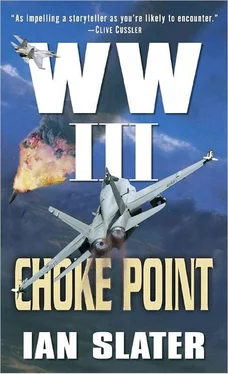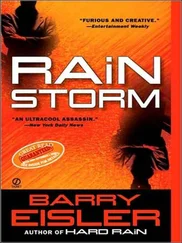“Dixon,” Freeman said, the general’s left hand acting as a pike for the RIB against the stack.
“Sir?”
“You see what nationality the guy was?”
“No, sir. Was all I could do to stop the bastard from killing—”
They both instinctively ducked, together with Choir and Salvini, the sub’s machine gun punching its heavy caliber rounds into the stack. The wind behind them made their impact so loud, it sounded as if they were going to come straight through the rock. The ricochets went every which way, one of them clipping the RIB’s defunct radio mast, which the man on the sub could see now and then as the inflatable rode up and down in the chop.
“Nothing particular about his weapons?” Freeman asked Dixon, the general’s cool under fire remarkable to Dixon, whose first kill had happened only a half hour or so before.
“Nothing particular that I saw on him, General.”
“Knife?” Freeman pressed.
“Son of a—” began Dixon in surprise, when another of the.50’s bursts found its target, keeping the Americans’ heads down, buying time.
“What was it you saw?” demanded Freeman.
“It was a TAK — ten-inch blade, with a — yeah, a drop point. I recognized it because some of the Canuck JTF-9 guys use ’em.” JTF-9 was the Canadians’ select antiterrorist commando force. “Canvaslike grip,” continued Dixon. “A cutting edge — I dunno — about four or five inches.”
“I know it,” said Freeman.
“What we need to know,” said Choir, “is what kind of sub it is.”
“Oh, I know that,” said Freeman. “It’s a midget!”
“Shit,” said Sal, shaking his head.
This time the three veterans’ laughter was joined by Dixon’s. He liked these guys. A hell of a situation they were in, unable to stop what might have been the biggest threat to American security in the history of the republic, and these guys could crack a joke — a weak joke, sure, but a joke. This, he thought, was what the drill instructors meant about “staying calm under fire.”
“For my money,” said Freeman, still talking about the TAK knife, “it means this damned sub might be supplied locally from across the line. From terrorists in Canada. Not the sub’s ordnance — that’s been dropped off. Probably the same freighter that dropped off the midget in the first place.”
“So?” pressed Sal, his tone of cheeky informality still capable of surprising Dixon, the outsider; a welcome one, but an outsider nevertheless.
“Whoever those bastards are on the sub,” Freeman said to Dixon, “you think you could get close enough to delay them a bit longer?”
The general’s question was just that — a question, not a command. The sub’s.50 paused for a moment. “Barrel probably getting too hot!” said Freeman, adding, “Remember, son, l’audace, l’audace, toujours l’audace !”
“It means—” began Sal.
“I know what it means, goddamn it!” replied Dixon hotly. “Yeah, I might get close enough with a swim buddy, but I haven’t seen Aussie. Have you?”
None of them had.
“Yeah,” said Sal, keeping his head low, “you’re right, Pete. It’d be pretty dicey. That’d be just what they’d be looking for.”
Two hundred yards away, Aussie cinched the strap on his flippers and, descending below the undulating and sunlit surface beneath the falls, went deeper, but not so deep that he couldn’t see his HE and flash-bang grenades and his MP5. He swung the submachine gun around to his front and loosened the sling so if they spotted him as he surfaced, he could squeeze off a burst — get the bastards’ heads down long enough for him to toss a couple of the grenades at the work party.
By now he’d seen that they had two of the bolts off the prop’s basket, one of the terrorists working so hard and fast he’d slipped on one of the anechoic tiles and into the sea. He was quickly jerked back up to the deck, monkey wrench still in hand, resuming work in seconds.
The next deep thumping sounds of the sub’s machine gun and the crackle of lighter AK-47 fire echoed off the stack, the base of which absorbed several hits. Fist-sized chunks flew off, some smacking loudly into the water, other fragments tearing into the RIB’s stern, which, despite Choir’s best efforts, had been caught in the constant wash behind the stack and sucked out from it long enough to make it at times a clearly visible target. Rock fragments from the stack had already taken out three or four feet of the inflatable flotation cells, and the resulting holes immediately flooded with seawater.
Then Freeman was knocked back into the stern and Sal crashed into Choir. The general, temporarily underwater, was spluttering obscenities as he surfaced. “Goddammit — that’s enough! Dixon!”
There was no answer.
“Dixon?”
“He’s gone,” said Sal, nodding in the direction of ten o’clock, at a point about twenty feet out. “He’s under, General. He slipped under during our scramble.”
Freeman was dragging himself aboard. “Can you still see him, Sal?”
“No.”
“Was he hit?”
Sal and Choir considered the question. They realized they didn’t know. Maybe he hadn’t dived in at all.
“Son of a — goddammit!” It was the general holding pieces of what used to be a functioning cell phone. “Goddamn it, that’s unreasonable!”
Sal was checking Dixon’s gear bag to see if there was any blood on it. There wasn’t, but he saw that the bag contained what was immediately recognizable as a three-foot-long spear gun. Collapsible.
“So,” put in Choir, “that’s how the laddie took care of his underwater nemesis. Never said a word, did he?”
“No,” said Sal. “He didn’t. Where the hell’s Aussie?”
Charles Riser was going home. Sent home by Ambassador Rogers, who had been his staunch defender at the embassy, more willing than most to “cut Charlie some slack,” as he put it, after the tragedy of Mandy Riser’s murder by Li Kuan’s terrorists in Suzhou. It wasn’t so much Charles’s behavior at the embassy in Beijing, but his unauthorized forays into Chinese officialdom, such as his pestering General Chang, which had resulted in a plethora of complaints from the Chinese. Beijing used the complaints to deflect the U.S. ambassador’s enquiries about why the PLA air force, under the guise of Red-Cross-flagged ships supposedly supplying the people of Penghu with urgently needed food supplies and rebuilding materials, had in fact been unloading more crates of MiG-29s Sukhoi 30 Flanker fighter-bombers.
Charlie was fuming, but in those rare moments of objectivity he forced upon his grieving soul, he knew that the ambassador had made the correct decision for the embassy as a whole.
While waiting for the China Air flight to Seattle via Narita, he took the photograph of Amanda from his wallet. There was something important about actually holding it. Merely looking at framed pictures of her had never been enough. Intellectually absurd, he told himself, but nevertheless it somehow drew her closer. The only photo of her that he kept in his wallet was one of her with their chocolate-colored spaniel. Mandy had called him “Truffles,” because of the dog’s ears. Truffle had habitually refused to surrender a grungy old rag Charlie’s wife had used to wipe the dog down when he’d rolled ecstatically in the piles of bitch-scented fall leaves from the border collie next door. Everyone said it was because of the collie’s scent that Truffles had refused to give up the disgusting old rag, but Charlie knew it was because of the dog’s memory of his wife. Truffles had held on to that rag until the day he died of grand old age, everyone fondly remembering the faint deathbed growl as the vet tried to move it during his final examination. The family, in fact, had erupted in laughter, and it had smoothed the beloved pet’s passing.
Читать дальше












